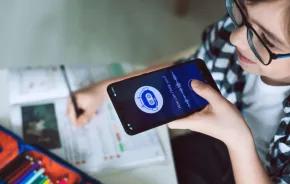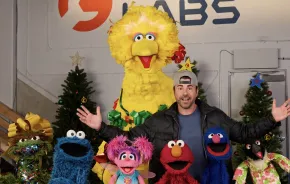One of the happy discoveries I made as a new parent was that children’s books are often deeply philosophical. Children’s authors seem aware of children’s philosophical propensities in ways most of us are not. Books by Arnold Lobel, Leo Lionni, Eleanor Estes, E.B. White, Natalie Babbitt, William Steig and many others all raise philosophical questions in ways both familiar to and engaging for children (and adults).
As you’re reading picture books and other children’s literature with your children, it’s natural to ask your child what questions the story makes him or her think about. If a story seems to you to raise a particularly interesting topic, you can point it out by asking your child, for example, “So what do you think makes someone a friend?” “Do you think you’d want to live forever?”
 For example, take Arnold Lobel’s story “Dragons and Giants" in Frog and Toad Together, one of my favorites. In that story, Frog and Toad begin to wonder if they are brave. They decide to find out by trying to climb a mountain. In the course of this adventure, they escape snake and hawk attacks and run away from an avalanche. After each encounter they shout, “We are not afraid!”
For example, take Arnold Lobel’s story “Dragons and Giants" in Frog and Toad Together, one of my favorites. In that story, Frog and Toad begin to wonder if they are brave. They decide to find out by trying to climb a mountain. In the course of this adventure, they escape snake and hawk attacks and run away from an avalanche. After each encounter they shout, “We are not afraid!”
After the final challenge, Frog and Toad run back to Toad’s house, where Frog hides in the closet and Toad jumps into bed and pulls the covers over his head. They comment that they are each glad that they know such a brave person like the other. They stay where they are for a long time, “just feeling very brave together.”
Are Frog and Toad brave? Can you be brave and afraid at the same time? If bravery is doing something that intimidates or scares you, is fear always part of bravery? Can you be brave if you aren’t afraid? Does bravery involve what you feel inside, or what you do, or both?
Or read Lobel’s story “Cookies,” in the same book. Here, Frog and Toad keep eating cookies that Toad baked. They note that they should stop eating them, and they agree a couple of times to stop after one last cookie. Frog observes that what they need is will power.
“What is will power?” asks Toad. Frog responds that it is “trying hard not to do something that you really want to do.”
Frog puts the cookies in a box, but when Toad points out that the box can be opened, Frog ties a string around the box. Frog takes more and more steps to make sure that they cannot get to the cookies and finally feeds them to the birds, telling Toad that now they have “lots and lots of will power.”
What is will power? Do Frog and Toad have it in the story? Is Frog right that will power is “trying hard not to do something that you really want to do?”
Recently I had an interesting discussion with a group of second-grade students about this question, and they noted that will power doesn’t always involve trying not to do something but can sometimes mean trying to do something you might not want to do. They pointed out that sometimes it takes will power to do their homework math problems.
We also wondered together about whether you can have will power even when you’re not using it. Can part of you want to do something and part of you not want to do it? The children were really interested in the idea that we have multiple selves with sometimes conflicting desires.
 Another of my favorite children’s books is Cynthia Rylant's An Angel for Solomon Singer, which tells the story of Solomon Singer, who lives in a hotel for men in New York City and doesn't like it. His room has no balcony or fireplace, and he cannot have a cat or dog, or even paint his walls a color of his choosing.
Another of my favorite children’s books is Cynthia Rylant's An Angel for Solomon Singer, which tells the story of Solomon Singer, who lives in a hotel for men in New York City and doesn't like it. His room has no balcony or fireplace, and he cannot have a cat or dog, or even paint his walls a color of his choosing.
"It is important to love where you live, and Solomon Singer loved where he lived not at all, and it was this that drove him out into the street each night." He wanders the streets, and eventually ends up in a restaurant, where a friendly waiter takes his order and suggests he return again.
Solomon returns night after night, and finds that eventually when he wanders the streets, on his way to the restaurant, they feel warm and beautiful, and that in the restaurant he feels he is home.
Some philosophical questions that stem from this story: What is home? What makes a place a home? Do we need a home? Why or why not? Is being home about a place outside of us, or about something inside us? Do homes involve the places we live or the people in our lives, or both? Can we be at home anywhere? Do homes change? Can a home become no longer a home? Does home mean the same thing to all people?
What I love about philosophy is that it inspires me to rethink what I believe, and I almost always come away from philosophical exchanges with a new idea or way of thinking about a problem because of something someone else pointed out.
Exploring philosophical questions with your child entails a genuine attempt to understand each other’s perspectives. When you’re talking about topics like identity, what makes someone a good person, or the meaning of life, in many ways you’re expressing the kind of person you are. Having these kinds of conversations with your child, and really listening to each other’s ideas, can help you attain a deeper understanding of one another and can support your child’s efforts to understand and define him or herself.
As one 10-year-old student once said to me, “I understand my own thoughts so much better after philosophy!”
 Jana Mohr Lone is the director and founder of the Northwest Center for Philosophy for Children, part of the Department of Philosophy at the University of Washington. Since 1995 she has taught philosophy to K-12 students in Seattle and run programs to introduce teachers, parents, grandparents, college and graduate students, and others to methods for bringing philosophy into young people's lives. She is the author of The Philosophical Child, a book for parents and grandparents about having philosophical exchanges with children. She writes the blog Wondering Aloud: Philosophy with Young People. She is the president of PLATO (Philosophy Learning and Teaching Organization), a national organization that advocates and supports introducing philosophy to young people.
Jana Mohr Lone is the director and founder of the Northwest Center for Philosophy for Children, part of the Department of Philosophy at the University of Washington. Since 1995 she has taught philosophy to K-12 students in Seattle and run programs to introduce teachers, parents, grandparents, college and graduate students, and others to methods for bringing philosophy into young people's lives. She is the author of The Philosophical Child, a book for parents and grandparents about having philosophical exchanges with children. She writes the blog Wondering Aloud: Philosophy with Young People. She is the president of PLATO (Philosophy Learning and Teaching Organization), a national organization that advocates and supports introducing philosophy to young people.












